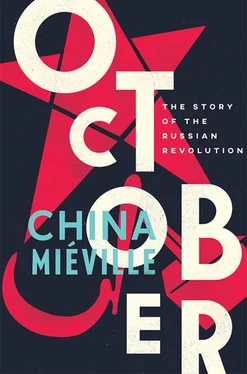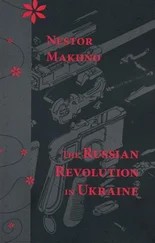But there is worse.
According to the ecstatic rant of Marx and Engels in the Communist Manifesto , it is the bourgeoisie which ‘historically, has played the most revolutionary part… put an end to all feudal, patriarchal, idyllic relations… pitilessly torn asunder the motley feudal ties’ – and thus, through the concentration of the working class at the point of productive power, created ‘its own grave-diggers’. But in Russia, the bourgeoisie are neither pitiless nor revolutionary. They tear asunder nothing. As the RSDWP manifesto has it: ‘The further east one goes in Europe, the more base, weak and cowardly does the bourgeoisie appear, and the more gigantic are the cultural and political tasks that fall to the lot of the proletariat.’
The author of these words, Peter Struve, will soon lurch to the right. In Russia, such so-called ‘Legal’ Marxists often find in their Marxism a roundabout way to be liberals, their focus shifting from workers’ concerns to the necessity of the capitalist ‘modernisation’ that Russia’s cowardly bourgeoisie cannot bring forth. An obverse or complementary left heresy is ‘Economism’, according to which workers must focus on trade union activity, leaving politics to those struggling liberals. Pilloried by those more orthodox for downplaying socialist struggle, and indeed quite ineffectual in their quietist solutions, such ‘Legal’ and ‘Economist’ heretics nonetheless focus on key questions. They have come up against a conundrum of left catechism: how does a movement go about being socialist in an unripe country with a weak and marginal capitalism, a vast and ‘backward’ peasantry, and a monarchy that has not had the decency to undergo its bourgeois revolution?

The tail end of the nineteenth century sees a flurry of imperial machinations, allegiance and counterallegiance underlying a steady hunger for expansion. Internally, the colonial drive means upholding the language and culture of dominant Russian elites at the expense of minorities. Nationalists and the left recruit prolifically from subordinated peoples and nations: Lithuanians, Poles, Finns, Georgians, Armenians, Jews. The socialist movement in the empire is always multi-ethnic, disproportionately comprising those of minority groups and nations.
Ruling over the whole patchwork since 1894 is Nicholas Romanov. As a youth, Nicholas II submitted stoically to his father’s bullying. As tsar he is distinguished by courtesy, dedication to duty, and little else. ‘His face’, one official hesitantly reports, ‘is expressionless.’ Absence defines him: absence of expression, imagination, intelligence, insight, drive, determination, élan . Description after bemused description turns on the ‘otherworldliness’ of a man adrift in history. He is a well-educated vacuity stuffed with the prejudices of his milieu – including pro-pogromist antisemitism, aimed particularly at revolutionary zhidy , ‘yids’. Averse to change of any kind at all, he is wholeheartedly wedded to autocracy. Uttering the word ‘intelligentsia’, he makes the same disgusted face as when he says ‘syphilis’.
His wife, Alexandra Fedorovna, a granddaughter of Queen Victoria, is deeply unpopular. In part this is jingoism – she is German, after all, at a time of mounting tensions – but it is also due to her frantic intrigues and patent contempt for the masses. The French ambassador Maurice Paléologue sketches her concisely: ‘Moral disquiet, constant sadness, vague longing, alternation between excitement and exhaustion, constant thought given to the invisible and supernatural, credulousness, superstition.’
The Romanovs have four daughters, and a son, Alexis, who is stricken with haemophilia. They are a close, loving family, and, given the tsar and tsarina’s obdurate myopia, they are utterly doomed.
From 1890 to 1914, the working-class movement grows in size and confidence. The state pursues ham-fisted strategies against it; in the cities, it attempts to contain burgeoning popular discontent with ‘police unions’, workers’ societies organised and overseen by the authorities themselves. But to have any traction at all, these must channel real concerns, and their organisers must be what the Marxist historian Michael Pokrovsky calls ‘clumsy imitations of the revolutionary agitators’. The demands they issue are mere echoes of workers’ calls – but in echoes, words can still be made out, with unintended consequences.
In 1902, a police-union strike takes over the whole city of Odessa. Similar mass protests spread throughout south Russia the following year, and not all under the aegis of the authorities’ puppet bodies. A strike spreads from the Baku oilfields through the Caucasus. Sparks of revolt flare in Kiev, Odessa again, and elsewhere. By now the strikers’ demands are political as well as economic.
During this slow acceleration, in 1903, fifty-one of the great and good of Russian Marxism relocate a crucial meeting from a vermin-flecked Brussels flour warehouse to London. There, in backrooms and cafés or overlooked by the fishing trophies of an angling club, over three disputatious weeks, the RSDWP holds its Second Congress.
It is in the twenty-second session of that gathering that a chasm opens between the delegates, a split remarkable not only for its depth, but also for the seeming triviality of its catalyst. The question is whether a party member should be one who ‘recognises the party’s programme and supports it by material means and by regular personal association under the direction of one of the party organisations’, or ‘by personal participation in one of the party organisations’. Martov demands the former. Lenin stakes all on the latter.
Relations between the two have been cooling for some time. Now after an intense, vigorous debate, Martov wins, twenty-eight to twenty-three. But various fits of huff and dudgeon ensue on other issues, and by the time the party leadership is to be decided, walkouts by the Jewish socialist group the Bund and by the Economist Marxists mean Martov has lost eight of his original supporters. Lenin manages to push through his choices for the Central Committee. Minority in Russian is menshinstvo , majority bolshinstvo . From these words the two great wings of Russian Marxism take their names: Martov’s Mensheviks and Lenin’s Bolsheviks.
At bottom this schism is about far more than membership conditions. Already during the conference Lenin was referring to his supporters as ‘hard’ and his opponents as ‘soft’, and the distinction will generally remain glossed in such terms: the Bolsheviks considered hard leftists, the Mensheviks more moderate – though this is not to deny the substantial range and evolution of opinions on each side. What fundamentally underlies the membership dispute – in winding, mediated fashion, and far from clearly, even to Lenin – are divergent approaches to political consciousness, to campaigning, to working-class composition and agency, ultimately to history and to Russian capitalism itself. This will emerge more plainly fourteen years later, when issues of the centrality of the organised working class will come to the fore.
For now, a Martovian counterattack comes quickly: the London decisions are rescinded, and Lenin resigns from the board of the party journal Iskra in late 1903. On the ground, however, in so far as they even know about it, many RSDWP activists consider the split absurd. Some simply ignore it. ‘I don’t know,’ one factory worker writes to Lenin, ‘is this issue really so important?’ Years pass while Mensheviks and Bolsheviks veer towards and away from semi-unity. The bulk of party members consider themselves simply ‘Social Democrats’, right up to 1917. Even then, Lenin will take some time to convince himself that there is no going back.
Читать дальше












